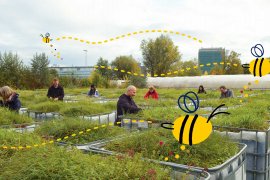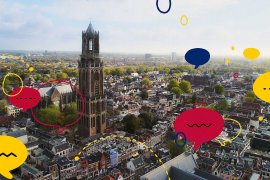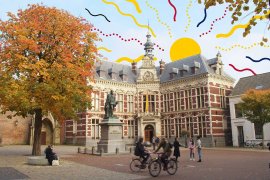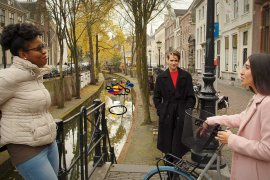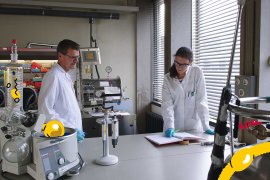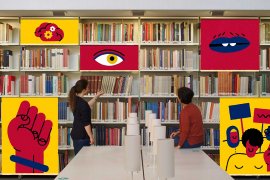Challenges in the world around us
Utrecht University holds a place in the heart of society. Developments in the world around us play a role in determining our strategy.
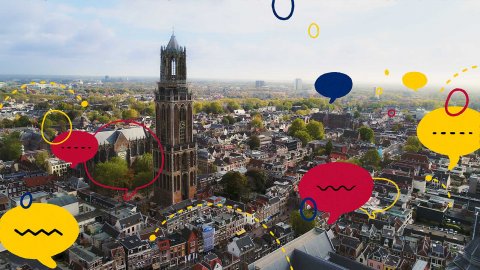
Social issues
Current social issues are complex and not limited to specific generations or continents, nor can they be resolved from a single perspective. Climate change, for instance, is prompting consideration of urgent social issues including the energy transition, how we structure our environment and circularity. The gap in society, between rich and poor and between people with high and low levels of education, is widening. On average, we live longer lives, which raises issues in relation to care, healthcare and health. All these challenges call for students, employees and alumni who seek out solutions and contribute to societal discourse. Fundamental research plays a crucial role in this regard.
These days, information – including scientific data – is readily available everywhere and at all times. Experts are not the only ones to form an opinion: thanks in part to new media, information has become accessible to everyone and the discussions have accelerated and intensified. Scientists must enter into an open interaction with many different parties in order to work together on solutions for social issues.
Scientists must enter into an open interaction with many different parties in order to work together on solutions for social issues.
During the COVID-19 pandemic, we have been able to see the interaction between science, policymakers and politicians on an almost daily basis. The transparent nature of science contributed positively to scientific findings, uncertainties and insights being fully taken into account, in addition to political and socio-economic considerations. It is precisely by forging connections with societal partners that we can demonstrate how academics cooperate with one another to develop and introduce their knowledge using transparent methods.
Trends in higher education
Globalisation and digitisation bring international knowledge and education to our doorstep. With the proverbial press of a button, our students have access to lectures from all corners of the globe. Digital technologies have yielded new opportunities in academic research. Scientists can share their data with colleagues at other universities by making it open access. The development and transfer of knowledge is no longer the sole province of knowledge institutions.
Globalisation and digitisation bring international knowledge and education to our doorstep.
There is an increasing expectation that universities will conduct research that benefits society as a whole, especially in the case of publicly-funded institutions. International efforts are therefore under way to create an open model for knowledge sharing and collaboration. Parties in both the Netherlands and the European Union are investing heavily in Open Science, which aims to see that research results, regardless of the form of the scientific output, are made freely available to others at the earliest possible stage. Open science deals with research, education and how we communicate with one another and with society at large.
The primary focus of university education is shifting from the transfer of knowledge towards the active application of knowledge and the development of skills. Students – the professionals of tomorrow – are gaining experience with personal skills such as self-reflection and creativity during their degree programmes. To an increasing extent, they will no longer be able to finish their academic track without interruption and combine their studies with work or other activities. Alumni can see that knowledge and the labour market are changing at a rapid pace. In order to maintain their employability, professionals must be willing to accept responsibility for their own development and be able to continue that development throughout their lives. All these aspects call for custom solutions and other – flexible – teaching methods. Due to the increased pressure to succeed, in combination with factors such as the limited availability of student housing, more students are experiencing mental health issues. This development calls for active policy and a more individualised approach to student guidance and accommodations.
Alumni can see that knowledge and the labour market are changing at a rapid pace. […] This calls for custom solutions and other – flexible – teaching methods.
Education and research are increasingly shifting towards the private sector. Traditional curricula are undergoing changes, stemming not only from how the education is being provided but as a result of external developments as well. New parties, both public and private, are emerging to take responsibility for portions of the curricula and develop global study programmes for professionals.
Universities are becoming more dependent on technology companies for their teaching and research infrastructure. In order to preserve the academic quality of data in this new landscape, collaboration in areas such as infrastructure is needed; this collaboration with universities in the Netherlands and beyond must be conducted in keeping with public values.
International collaboration is crucial to the quality of universities.
The international mobility of students and staff has grown immensely in recent decades. Students from all over the world study in Utrecht and international staff are part of our university community. Their knowledge and cultural backgrounds enrich our education and research and their different perspectives add value to the academic debate. Due in part to the influx of international staff and students, our university community is becoming more diverse. An increasing range of cultural, religious and socio-economic backgrounds are represented. International collaboration is crucial to the quality of universities and is actively promoted by the European Union. Despite the public debate on the anglicisation of higher education, the number of degree programmes being taught in English at the Dutch universities has greatly expanded in previous years.
Increased cooperation
Viewed in an international context, Dutch universities perform quite well. The universities contribute strongly to the Netherlands’ position as a knowledge economy and its economy in general. This is resulting in a growing influx of Dutch and international students in academic education.
Investments in the system are needed, yet currently seem to be limited to science and technology and to come at the expense of funding for other fields of study. All disciplines, however, are indispensable to any society that wishes to progress: both technological development and cultural preservation, scientific discoveries as well as knowledge on behavioural change, and both fundamental and more applied research. A forward-looking society stands to benefit precisely from a multidisciplinary approach to societal challenges, which calls for investment in all disciplines.
A forward-looking society stands to benefit precisely from a multidisciplinary approach to societal challenges, which calls for investment in all disciplines.
In recent years, research funding in the Netherlands and the European Union has shifted from free and independent research to more demand-driven, affiliated research. In the case of affiliated research, companies or civic society organisations offer input to help determine the focus of the research. Immense competitive pressure exists in the research world as well, with only a small portion of applications being approved for funding. This competition contributes to an increased workload among researchers. The financial structure and increasing competition are having a detrimental effect on work pressure and the well-being of students and PhD candidates as well.
Universities and government bodies need one another in order to reduce the pressure in higher education and research and to maintain our global position as a knowledge economy. Greater cooperation and less unnecessary competition have been established as priority areas for the coming period on the Strategic Agenda of the Ministry of Education, Culture and Science. Mitigating competitive incentives will require that institutions – in mutual consultation with the VSNU and, for example, the LERU – choose aspects with which to differentiate themselves while also identifying those areas in which they wish to cooperate.
The faculties and the Strategic Plan
The faculties have made a further interpretation of the university's course for the coming years. In the Faculties' plans, the faculties describe the ambitions for their organisation, for education and for research. With their own emphases, embedded in the university's Strategic Plan.

